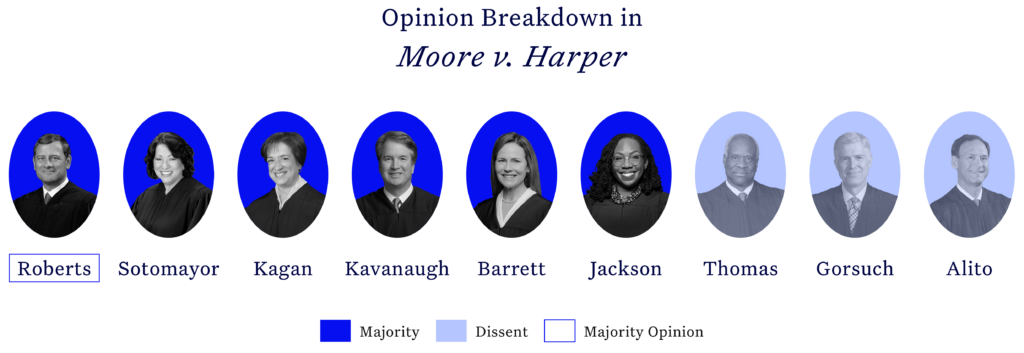U.S. Supreme Court Rejects Independent State Legislature Theory in Moore v. Harper
WASHINGTON, D.C. — On Tuesday, June 27, the U.S. Supreme Court issued a 6-3 decision in the landmark case Moore v. Harper, with a majority of the Court ruling to reject the radical independent state legislature (ISL) theory.
In the pro-democracy opinion, authored by Chief Justice John Roberts, the Court held that the “Elections Clause does not vest exclusive and independent authority in state legislatures to set the rules regarding federal elections…[and] does not insulate state legislatures from the ordinary exercise of state judicial review.” Roberts was joined by Justices Sonia Sotomayor, Elena Kagan, Brett Kavanaugh, Amy Coney Barrett and Ketanji Brown Jackson. Justices Clarence Thomas, Neil Gorsuch and Samuel Alito dissented.

“When state legislatures prescribe the rules concerning federal elections, they remain subject to the ordinary exercise of state judicial review,” the opinion emphatically states. This decision represents a repudiation of the ahistorical and unfounded ISL theory and allows state courts to continue to play an indispensable role in reviewing congressional maps — and other election laws regulating federal elections — enacted by state legislatures to ensure their compliance with state constitutions.
Today’s ruling in Moore originates from what began as a standard redistricting lawsuit challenging North Carolina’s new congressional and legislative maps drawn by the Legislature using 2020 census data. (Although all three sets of maps were challenged in state court, only the congressional map was ultimately at issue in the North Carolina Republicans’ appeal to the U.S. Supreme Court.)
In the ensuing state court litigation, the North Carolina Supreme Court ultimately struck down the challenged congressional map in February 2022 for being a partisan gerrymander that violated the state constitution and ordered it be replaced with a fairer interim congressional map drawn by court-appointed special masters for the 2022 election cycle.
In response to the adoption of this map, North Carolina Republican legislators petitioned the U.S. Supreme Court and invoked the ISL theory to argue that the Elections Clause of the U.S. Constitution grants state legislatures the sole authority to draw new congressional districts and that state courts cannot review legislatively drawn congressional maps to determine whether they comply with a state’s constitution.
However, after the U.S. Supreme Court heard oral argument in Moore on Dec. 7, 2022, North Carolina Republican legislators asked the North Carolina Supreme Court — which shifted from a Democratic to Republican majority in the 2022 midterm elections — to rehear and overturn its prior decisions ruling the state’s congressional and legislative maps were partisan gerrymanders. Following rehearing, the North Carolina Supreme Court ultimately ruled in favor of the Republican legislators.
In spite of the rehearing in the North Carolina Supreme Court, the majority opinion in Moore notes that “this Court has jurisdiction to review the judgment of the North Carolina Supreme Court in Harper I that adjudicated the Federal Elections Clause issue.”
Today’s ruling resoundingly rejects the specious ISL theory, cementing the power of state courts to review federal election rules and congressional districts passed by state legislatures. Additionally, the decision indicates that the Court is unlikely to take up an appeal of a lawsuit by Republican legislators out of Ohio that similarly raises the ISL theory.
Currently, Democracy Docket is tracking seven cases in state courts challenging congressional maps and 21 cases in state courts challenging voting laws or procedures under state constitutions or state law. With the Supreme Court’s rejection of the ISL theory, these cases will be able to move forward unimpeded by the ISL theory. Importantly, state courts will be able to continue performing the crucial duty of reviewing challenges to congressional redistricting schemes that allegedly violate state constitutions or state law.